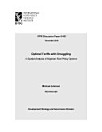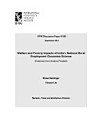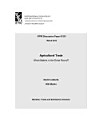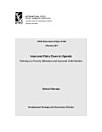Reverse-Share-Tenancy and Marshallian Inefficiency: Landowners Bargaining Power and Sharecroppers Productivity
Hosaena Ghebru Hagos · Stein T. Holden
maig del 2013 · IFPRI Discussion Paper Llibre 1 · Intl Food Policy Res Inst
Llibre electrònic
48
Pàgines
family_home
Apte
info
reportNo es verifiquen les puntuacions ni les ressenyes Més informació
Sobre aquest llibre
While there are ample empirical studies that claim the potential disincentive effects of sharecropping arrangements, the existing literature is shallow in explaining why share tenancy contracts are prevalent and diffusing in many developing countries. Using a unique tenant-landlord matched dataset from the Tigray region of Ethiopia, we are able to show how the tenants strategic response to the varying economic and tenure-security status of the landlords can explain sharecroppers productivity differentials. To the best of our knowledge, this is the first study to use tenantlandlord matched data that accounts for both the supply (landlord) and demand (tenant) side characteristics in analyzing sharecroppers level of effort and productivity. The study reveals that sharecroppers yields are significantly lower on plots leased from landlords who are non-kin, who are female, who have lower income-generating opportunity, and who are tenure insecure than on plots leased from landlords with the opposite characteristics. While, on aggregate, the results show no significant efficiency loss on kin-operated sharecropped plots, more decomposed analyses indicate strong evidence of Marshallian inefficiency on kin-operated plots leased from landlords with weaker bargaining power and higher tenure insecurity. This study thus shows how failure to control for the heterogeneity of landowners characteristics can explain the lack of clarity in the existing empirical literature on the extent of moral hazard problems in sharecropping contracts.
Puntua aquest llibre electrònic
Dona'ns la teva opinió.
Informació de lectura
Telèfons intel·ligents i tauletes
Instal·la l'aplicació Google Play Llibres per a Android i per a iPad i iPhone. Aquesta aplicació se sincronitza automàticament amb el compte i et permet llegir llibres en línia o sense connexió a qualsevol lloc.
Ordinadors portàtils i ordinadors de taula
Pots escoltar els audiollibres que has comprat a Google Play amb el navegador web de l'ordinador.
Lectors de llibres electrònics i altres dispositius
Per llegir en dispositius de tinta electrònica, com ara lectors de llibres electrònics Kobo, hauràs de baixar un fitxer i transferir-lo al dispositiu. Segueix les instruccions detallades del Centre d'ajuda per transferir els fitxers a lectors de llibres electrònics compatibles.










